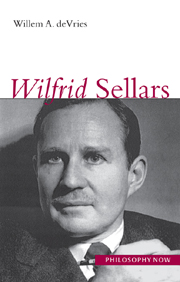Book contents
- Frontmatter
- Contents
- Preface
- Abbreviations
- 1 Sellars's philosophical enterprise
- 2 Sellars's philosophy of language
- 3 Categories, the a priori, and transcendental philosophy
- 4 Sellars's nominalism
- 5 Knowledge and the given
- 6 Science and reality
- 7 Intentionality and the mental
- 8 Sensory consciousness
- 9 Practical reason
- 10 The necessity of the normative
- Notes
- Bibliography
- Index
9 - Practical reason
- Frontmatter
- Contents
- Preface
- Abbreviations
- 1 Sellars's philosophical enterprise
- 2 Sellars's philosophy of language
- 3 Categories, the a priori, and transcendental philosophy
- 4 Sellars's nominalism
- 5 Knowledge and the given
- 6 Science and reality
- 7 Intentionality and the mental
- 8 Sensory consciousness
- 9 Practical reason
- 10 The necessity of the normative
- Notes
- Bibliography
- Index
Summary
Almost thirty years ago, W. David Solomon lamented the neglect of Sellars's ethical writings. The situation has not changed in the interim. With a few exceptions, Sellars's essays in ethical theory are as daunting as his most technical work in metaphysics, highly abstract and compact in the statement of the problems considered and the solutions proposed, and bristling with formalisms. This may explain the neglect of his ethical work, but it cannot justify it. Sellars stands out from his contemporaries Quine and Davidson by his significant body of writings on ethics. Since a great deal in his “system” rides on the nature of the normative, a well-worked-out treatment of actions and oughts is crucial to the overall completeness of his philosophical vision.
In moral theory, as in so many areas of philosophy, Sellars thinks that rationalism (generally called ‘intuitionism’ in ethics) best captured the “grammar” of ethical concepts, but “contaminated it with platonizing factualism”. Classical empiricism rejects the platonizing, but attempts to inappropriately (that is, reductively) naturalize ethical concepts instead, either in a theory of moral sentiments or in psychologistic consequentialism. The naturalizing impulse should not mislead us into a reductive account of ethical concepts.
Sellars takes the idea of practical reason absolutely seriously. At the time Sellars was forming his ethical views, that idea was very much in doubt.
- Type
- Chapter
- Information
- Wilfrid Sellars , pp. 246 - 268Publisher: Acumen PublishingPrint publication year: 2005



